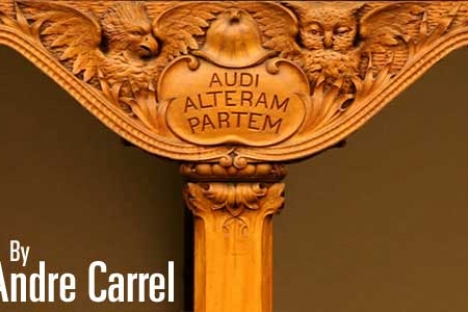Op/Ed: Monty Python or Kafka?
I have occasionally been critical of the way we do politics. The recent leaders’ debate on electoral reform provides me with material to explain.
The Opposition prefers electoral reform to be studied by a citizens’ assembly, as in 2003, over the Government’s process. It is a reasonable proposal. The members of the 2003 Citizens’ Assembly were selected at random. It was not an absolute random process; it was structured to ensure gender balance, fair age group representation, and equal constituency representation with the addition of two Aboriginal citizens and a chair. The Citizens’ Assembly members were selected at random, contingent on proportionality.
We already have a citizens’ assembly; we know it as the Legislative Assembly. Both are assemblies of citizens charged with providing a service to fellow citizens. Why is a 2003-style Citizens’ Assembly preferable to the Legislative Assembly? If it is because the Citizens’ Assembly representation is more balanced (proportional) than the Legislative Assembly, maybe MLAs should be selected at random by the Citizens’ Assembly process rather than being elected as they have been for over a century?
The parties represented in our legislature appear to agree that an assembly structured to fairly reflect the provinces citizens and their communities has merit. On what points then do the parties disagree? Why should fair (proportional?) representation be important for the limited purpose of electoral reform, but not for general governance purposes, from environment to education to health to transportation and budgets?
Our Constitution does not prevent the Legislative Assembly’s parties from reaching a consensus to allow each party to submit one (or more) electoral systems for consideration by the electorate. Let the Greens, the Liberals, and the New Democrats promote whichtever electoral system they prefer.
The parties could also reach a consensus on suitable referendum process and schedule. Mail-in ballot or conventional voting; stand alone or in conjunction with municipal or the provincial elections. The Union of B.C. Municipalities and the B.C. Assembly of First Nations could be invited to administer the referendum vote under the direction of Elections B.C.
Factual information could thus be available not just on the Internet, but in local government offices everywhere. Much confusion about the process, accusations and counter-accusations, could thus be avoided. Party leaders would be motivated to use public speaking and debating opportunities to emphasize the advantages of their preferred electoral system rather than fueling confusion by fighting each other over procedural matters. As partners rather than adversaries in the process, it would be in all parties’ interest to forge contingency plans to protect the process in the event of disturbances such as the rotating postal strike.
Doing politics with a focus on the common good over narrow party interests requires the kind of leadership that recognizes that the Legislative Assembly is in fact a citizens’ assembly with a fancy name. We elect members to that assembly to represent us all, equally and fairly, and to work together for the common good. When the purpose of elections is reduced to building up brownie points with an eye to the next election, they lose their democratic relevance.
The politics swirling around this referendum campaign have all the ingredients of a Monty Python skit. But this is not a comedy, and the modus operandi of the people we have elected to serve us our citizens’ assembly in Victoria is more Kafka than Monty Python.
























